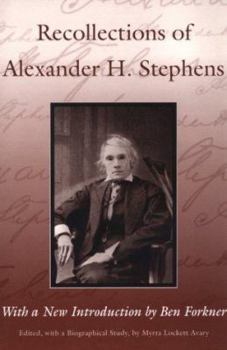Recollections of Alexander H. Stephens: His Diary, Kept When a Prisoner at Fort Warren, Boston Harbour, 1865
Select Format
Select Condition 
Book Overview
From May 27 to October 12, 1865, while imprisoned by the Union army, the Confederate vice-president Alexander Stephens confided to the pages of a journal his struggle between extraordinarily rich inner resources of mind and spirit and a harrowingly uncertain existence fraught with illness, deprivation, isolation, despondency, and humiliation. For Stephens, the journal -- which he would not allow to be published while he was alive -- may have manifested his severest trial and his utmost success in perseverance and good humor.Ben Forkner's introduction to this new edition of Myrta Lockett Avary's 1910 publication offers fresh and fetching consideration of Stephens' prison diary both as a reflection of the American Republic that disappeared in the Civil War and as a profoundly personal statement revelatory of the character and principles that won Stephens respect from southerners and northerners alike.
Format:Paperback
Language:English
ISBN:0807122688
ISBN13:9780807122686
Release Date:June 1998
Publisher:LSU Press
Length:572 Pages
Weight:1.85 lbs.
Dimensions:1.3" x 5.9" x 8.9"
Customer Reviews
1 rating
A new understanding of Alexander Stephens
Published by Keith , 3 years ago
For years I was indoctrinated, no…I was brainwashed on Stephens and his most famous Cornerstone speech of how slavery was the cornerstone of the Confederacy. After reading this book, my attitude has changed.
It is obvious Stephens was a constitutional man, that he believed in the constitution, it’s protections, and what it actually means. He takes his beliefs from the original founders. Stephens had a much clearer understanding of the US constitutions than did his counterparts in the Union.
He addresses his speech and how it was “extemporaneous” and published with “several glaring errors.”
He addresses secession and explains how each state has the right to voluntarily leave the Union just as it voluntarily joined. He was adamantly a Union man and voted against secession at the Georgia convention. Yet, because he was a citizen of Georgia first, he followed his state.
Reading this book will show you that in his words, while slavery was an occasion for secession, it surely was not the reason, which was violations of the constitution.
For those who would say that he changed his mind because the south had been beaten, this was a personal diary that he did not expect to be published (it was unheard of until 1910) so he had no reason to lie to himself.
This is a must read for a student of history from that time…but you must read it because you will not hear it taught in schools, colleges or universities.





